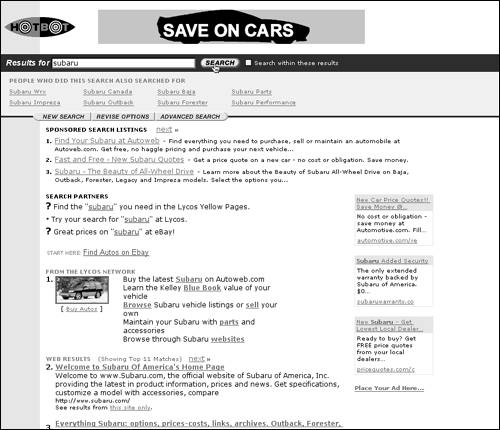targeting ads
| All advertisers in all media target their ads: They choose specific venues in order to reach a particular type of audience at a particular moment. But ad targeting is more powerful online, because we have the ability to track what users are viewing and dynamically match ads to their interests, with great precision. 2 ways to target ads:
content targetingContent targeting takes two forms: keyword targeting, used on search engines, and channel (or topic) targeting, primarily used on portals and news sites. keyword targeting Since 1995 beginning with a site called Infoseek search engines have targeted ads against specific search terms. So when a user searched for "rhododendron," he was likely to see an ad for a gardening store. This quickly became one of the most powerful and effective ways of advertising: It's a great coup, after all, for companies to reach users at the exact moment they're thinking about their products. All search engines now sell ads based on keywords, and some (like Google and Overture) make it easy for small sites to run ads against specific words. channel targeting Beginning in 1997 and led by Excite, most portals added subject-oriented sections, called "channels." These channels, which included topics like "Computers & the Internet" and "Cars," became prime advertising areas, because they narrow down the user's interests. A user who clicks on "Cars," for example, is the best possible candidate to see a car company's ad. eBay Cars ad on HotBot. This ad (for eBay cars) is targeted to appear on any search for car-related words, such as this one for "Subaru." And it works: If you're looking to buy, it's bound to catch your eye. Of course, this isn't far afield from what newspapers and magazines have always done creating a weekly section on Autos, or running ads near related content. The model works well online and is applied widely across portals and news sites. user targetingOnline ads can also be targeted toward specific users, based either on the profile they've created with a particular site or more generic facts about their computer. Most user targeting is still quite primitive focused mainly on simple facts like computer type. Because web servers can detect what platform (Windows, Macintosh, Unix) a user is on, ads can be displayed to one platform or the other. So Apple Computer could if it wanted show its ads only to people who already use a Mac. Eventually, though, user targeting will become far more sophisticated, as our ability to collect and analyze data on individual users grows. And it's bound to raise a few legal and ethical eyebrows. On a personal level, I'm deeply conflicted about these developments. On one hand, I'm concerned about the privacy issues raised and about corporate control of personal information. On the other hand, I love getting ads that are targeted to my needs. If I could live in a world where all ads catered to my personal interests in historical fiction, strong coffee, rugged winter wear, and Cynthia Rowley dresses, I'd be a very happy shopper. Except, as I said, for that whole privacy thing. |
EAN: 2147483647
Pages: 195
